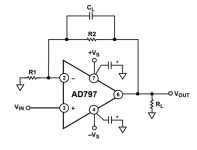Hi
I plan to build an input stage using AD797 in non-inverting configuration with 3x gain. (diagram attached)
In the application note it is written that it is necessary to keep the resistance of the feedback network low (R1+R2) AND ensure that the input resistance is matched.
My linear stage is preceded by a resistor logarithmic ladder with a fixed output impedance. The non-inverting input of the AD797 always sees 2kOhm.
In this situation, I can either provide input resistance matching (R2=6kOhm, R1=3KOhm) OR keep the feedback network resistance low ( e.g. R2=300 Ohm R1=150 Ohm)
Which approach do you think will have more benefits?
Marek
I plan to build an input stage using AD797 in non-inverting configuration with 3x gain. (diagram attached)
In the application note it is written that it is necessary to keep the resistance of the feedback network low (R1+R2) AND ensure that the input resistance is matched.
My linear stage is preceded by a resistor logarithmic ladder with a fixed output impedance. The non-inverting input of the AD797 always sees 2kOhm.
In this situation, I can either provide input resistance matching (R2=6kOhm, R1=3KOhm) OR keep the feedback network resistance low ( e.g. R2=300 Ohm R1=150 Ohm)
Which approach do you think will have more benefits?
Marek
Attachments
Yr first sugesstion is input impedance matched:
My linear stage is preceded by a resistor logarithmic ladder with a fixed output impedance. The non-inverting input of the AD797 always sees 2kOhm.
In this situation input resistance matching (R2=6kOhm, R1=3KOhm)
My linear stage is preceded by a resistor logarithmic ladder with a fixed output impedance. The non-inverting input of the AD797 always sees 2kOhm.
In this situation input resistance matching (R2=6kOhm, R1=3KOhm)
Yes. Do you believe its a better option?Yr first sugesstion is input impedance matched:
Yes, ive just tried the
797 a few times, but matched gets better in som way, also DC output.
I like it as audio amp also. It get cinda werry onest.onest
797 a few times, but matched gets better in som way, also DC output.
I like it as audio amp also. It get cinda werry onest.onest
Last edited:
In this situation, I can either provide input resistance matching (R2=6kOhm, R1=3KOhm) OR keep the feedback network resistance low ( e.g. R2=300 Ohm R1=150 Ohm)
Which approach do you think will have more benefits?
They both have one benefit and one disadvantage:
Matching: smallest systematic DC offset, but somewhat more noise
Low: lowest noise, but somewhat more systematic DC offset
that's what I'm thinking.Matching: smallest systematic DC offset, but somewhat more noise
Low: lowest noise, but somewhat more systematic DC offset
However, which way to choose?
Think about what consequences offset and noise have for your circuit and choose whatever you dislike least. If it's a circuit that handles line level signals and if there is a high-pass (AC coupling or so) somewhere further down chain, chances are that the noise is negligible and the offset is blocked.
yes, both are most likely true.chances are that the noise is negligible and the offset is blocked.
Which leaves the question of which solution to choose open.
For a 2k impedance the AD797 isn't the quietest opamp, it excels around 400ohms. I'd go with a lowish impedance anyway, just to reduce the influence of stray capacitance on the network, say 500R:1k network, but its moot.
Do care about offset, or a tiny amount of noise?
Not knowing where/how the output is used, I can't answer, but I would match the impedances as the default answer.
Best case is the noise might be reduced by 3dB with a low Z feedback. Likely won't be realized.
Look at input bias current/offset spec to estimate the offset improvement.
Not knowing where/how the output is used, I can't answer, but I would match the impedances as the default answer.
Best case is the noise might be reduced by 3dB with a low Z feedback. Likely won't be realized.
Look at input bias current/offset spec to estimate the offset improvement.
- Home
- Source & Line
- Analog Line Level
- AD797 - low feedback network resistance or matched input resistance
